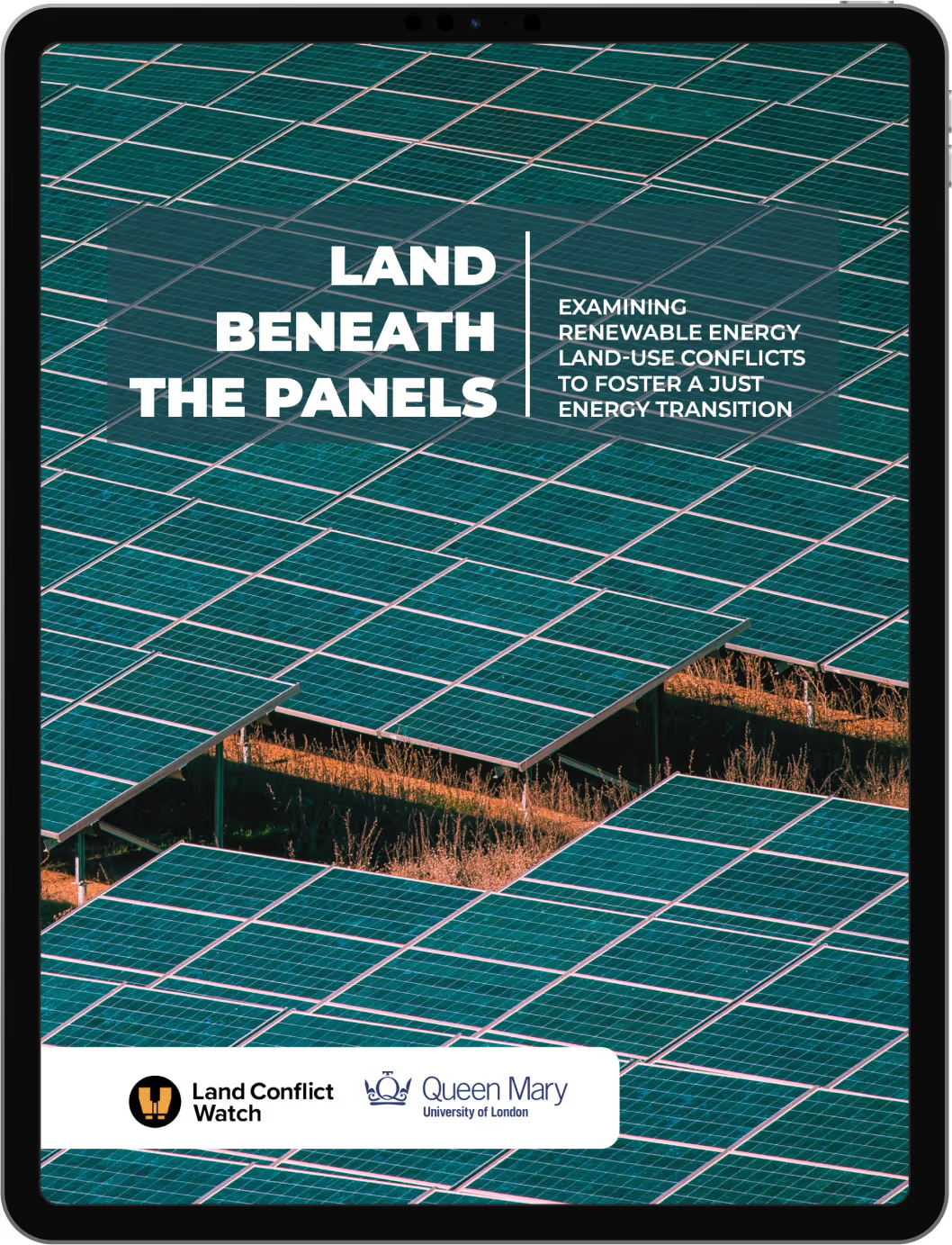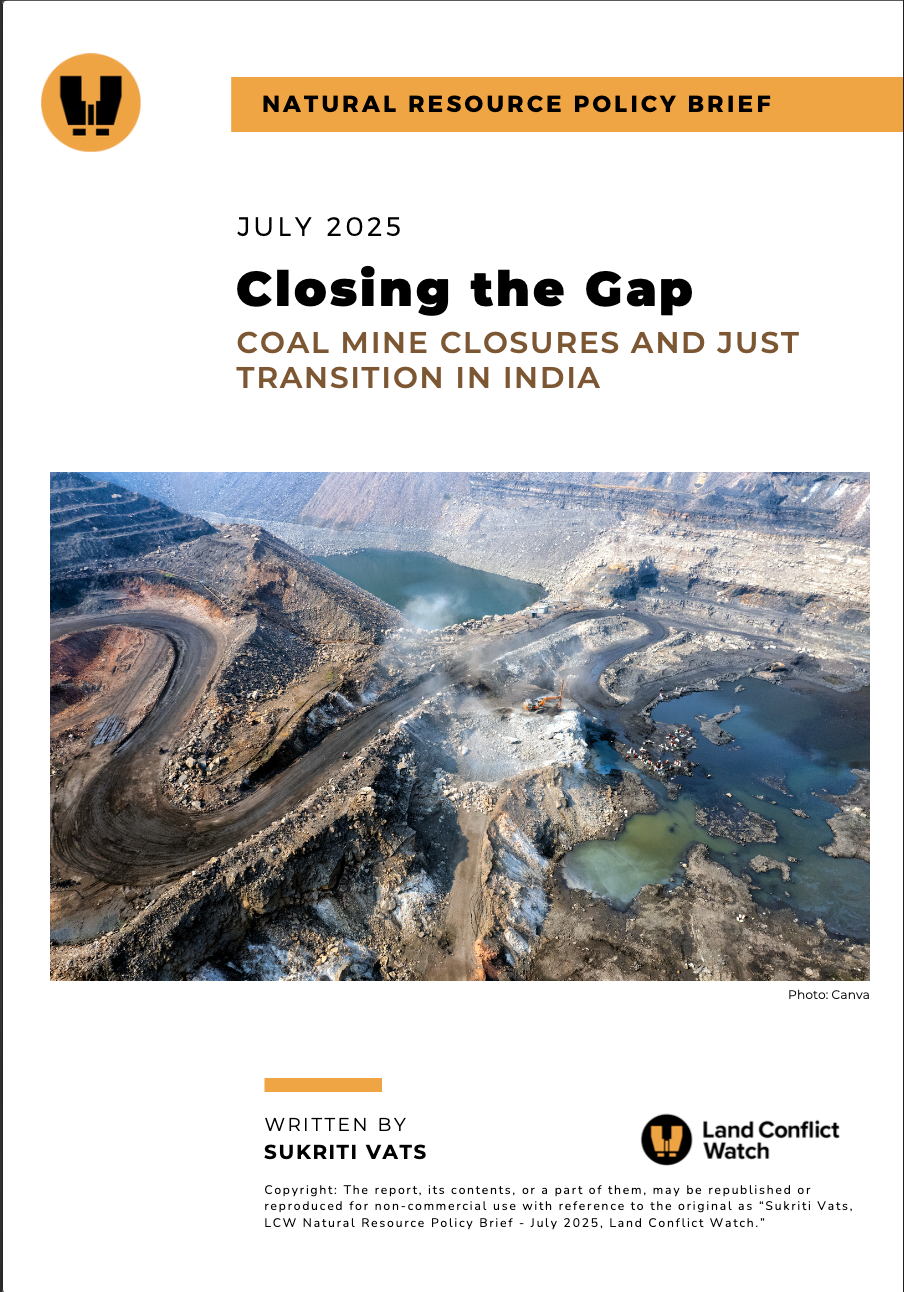








Report
The third edition of report focuses on the drivers, impacts, and systemic issues affecting local communities. The India chapter, produced by LCW, looks at 128 conflicts from 2023 and identifies the most vulnerable stakeholders.
-01-min.png)



Quarterly report
How a Supreme Court case verdict reinterpreted law against landowners.
















Report
This draft paper, presented at a discussion forum of the Property Rights Research Consortium in July 2021, undertakes an interim analysis of 242 conflicts, demonstrating how research questions can be answered using the information available in the database.



Report
An interim analysis of 289 ongoing land conflicts in the country. The study provides inferences about the spatial and sectoral distribution of these conflicts and how they affect close to 32 lakh people, thus revealing the structural flaws in the social, agrarian and institutional structures.












Policy brief
In our policy brief July 2025 Natural Resource Policy Brief we’re taking a close look at a critical catalyst for India’s just transition efforts, coal mine closures. This brief presents an evidence-based assessment of closure practices across India. It maps the growing gap between policy and practice, and evaluation what can be done to achieve a Just Energy Transition. We dive into topics like mines closure rates, inconsistent classification of mines, use of land on unclosed mines, participation of communities, tenure technicalities, and look at India’s current status and financial needs. We also share policy recommendations looking at improved governance, ensuring tenurial justice, and centering community voices in the closure process.




Policy brief
In 2015, two villages under the Pipariya Group Gram Panchayat, in Maharashtra’s Nagpur district, filed 3 Community Forest Rights (CFR) claims. They sought the right to collectively access, manage, and protect forest resources such as tendu leaves, mahua flowers, feedstock, and wild vegetables under the FRA. FRA aims to grant titles of forestland and resource rights to forest-dwelling communities, if they prove occupancy or dependence on the forestland from before 2005. The claims are processed primarily at the Gram Sabha level, which involves submitting at least two pieces of evidence of their occupation. It is then processed at the Sub-Divisional Level Committee (SDLC) and the District Level Committee. 4 In 2018, the villagers discovered that their claims had not progressed beyond the SDLC. They were told by the tehsildar and Sub-District Officer, that their applications were incomplete as they did not include the requisite proof of occupation.




Policy brief
The construction of Azure Power’s solar power plant, in Mikir Bamuni Grant village in Nagaon district, in Assam triggered conflict with allegations of land grabbing and violations of indigenous farmers’ land rights. The conflict began in 2019 with the descendants of an erstwhile zamindar family and their 1 associates entering into an “agreement of sale” for 91 acres of land to Azure Power Forty Pvt Ltd. It affected 60 farming families, who depended on the land for their livelihood, and were mostly growing rice and vegetables as tenants, for generations.




Policy brief
India aims to secure critical minerals to aid its energy transition and net-zero emissions targets. In August 2023, the Mines and Mineral (Development and Regulation) Act was amended to incentivise private participation in mining of critical minerals. The first tranche of auctions for private bidders was held soon after, including Gujarat’s Aravalli district. The auction failed to attract any bidders for the Gujarat blocks but is slated to be held again.




Policy brief
The FRA process in Gujarat began in 2008-09, with several claims rejected due to reliance on inadequate satellite imagery by BISAG.Ongoing issues in northern Gujarat include reduced claim areas and scepticism towards GEER's satellite imagery, with continued rejections despite supporting evidence.




Policy brief
The Roshni Act, aimed at addressing landlessness, and funding power projects, led to allegations of favouritism toward wealthy and politically connected individuals. In the Hindu-dominated Jammu region, the right wing saw it as an attempt to unjustly favour the Muslim community—the narrative is that the union territory’s majority-Muslim population is attempting to dominate Jammu.




Policy brief
Around 7,000 residents of six North Goa villages now routinely face water shortages due to the construction of the new Mopa airport on the Barazan Plateau. The government’s proposed expansion of the airport, if implemented, is likely to be disastrous for over 75,000 residents of Pernem Taluka in the North Goa district.




Policy brief
A "Just Transition" task force was formed in Jharkhand, India's leading coal producer, in November 2022. Its mandate was to ease the transition from coal to green energy while protecting the livelihoods of those dependent on the coal industry. India's commitments to shift from fossil fuels to renewables, made during COP26 in 2021, spurred the formation of the task force.




Policy brief
The parliament recently amended the Biological Diversity Act, 2002. Set to come into force on April 1, 2024, the amendment changes the original law for ‘ease of doing business’ . The amendment excludes the traditional medicine manufacturers from the obligation to pay a small portion of their profits - Access and Benefit Sharing (ABS) - towards conservation of herbs and sustenance of communities conserving these herbs.




Policy brief
The Rajasthan government has brought in several relaxations and schemes through policies like Wind & Hybrid Energy Policy, 2019, and Renewable Energy Policy 2023 to incentivise power companies to set up shop in the State. The former especially has made the availability of land easier for them through concessions and allotment of government land.




Policy brief
The Forest Rights Act (FRA) recognises the rights of tribals and forest dwellers over land they have been residing in for generations. The VanMitra portal was launched in 2019 to make the review of rejected FRA claims speedy and transparent. However, the rejection rates of individual forest claims increased after its introduction. The portal had been dormant for months now. Many claimants alleged that it had not been working since 2020. There had been a lot of misinformation around the portal that along with a lack of people’s tech knowledge and lack of access to gadgets created a lot of confusion in filing claims. At the primary level itself, the power to accept/reject claims had been taken over by the FRC instead of Gram Sabha, invalidating the law that was meant to empower the latter. Awareness campaigns, robust site, easy interface, availability of an option to apply offline – all these and more steps can help the system become better.




Policy brief
Land acquisition for the dam and compensatory afforestation will affect 14 villages in Chhatarpur district and 11 villages in Panna district. The Madhya Pradesh government will acquire 3,830 hectares for these works. Project-affected people have raised objections against land acquisition notices, alleging flawed land measurements and incorrect valuation of their homes.




Policy brief
While the current Congress government in Chhattisgarh has made its support for the Forest Rights Act a part of its re-election campaign, an analysis of data at the block and district level in the Udaipur block of the Surguja district shows that the area of land claimed for ownership by individuals does not tally with the area granted on their ownership certificates. The data shows a gap of around 10,000 acres between the two at the district level. This is an issue that can be observed across the state in the implementation of the Individual Forest Rights (IFR) provision of the FRA. The reality of having received small parcels of land as opposed to the actual area that they are cultivating has raised concerns among Adivasi communities.




Policy brief
Failed Promises: The Forced Eviction of Bengali-Speaking Muslim Farmer Families in Assam

_pages-to-jpg-0001.jpg)


Policy brief
A Flawed Conservation Measure : Purse Seine Ban Exposes Vulnerabilities of Fisherfolk in Tamil Nadu




Policy brief
The tribal communities in Kerala’s Attappady block are facing the issue ofland alienation. Non-tribal settlers, primarily from Tamil Nadu and Kerala, are encroaching ontribal lands and claiming ownership through counterfeit sale agreements andforged documents. The tribal communities have traditionally held ownership of the land inAttappady; however, they have been unjustly labelled as “encroachers” bynon-tribal settlers. Despite the legal prohibition against selling tribal

_page-0001.jpg)


Policy brief
A dispatch from the power corridors of the capital - In this policy brief, our researcher Prudhviraj Rupavath dives into the details of the Energy Conservation (Amendment) Act, 2022 and the implications of the proposed amendments that didn’t make it. Prudhviraj explains how a power move by the Prime Minister's Office stopped the Power ministry to decentralise regulation and administration of carbon markets and other energy conservation schemes.




Policy brief
A dispatch on the Supreme Court’s efforts to revise the value of forests in India - This policy brief, written by our Climate Research lead Mrinali, looks at the system through which project developers are mandated to pay the price equal to the value of the forests or Net Present Value (NPV). Despite previous Supreme Court orders stating that this value must be revised every three years, the NPV has remained unchanged for 13 years. Mrinali explains how the current system of NPV does little to discourage developers from taking over forest land. And how the logic behind assigning a monetary value to forests in the first place should be revisited.

_page-0001.jpg)


Policy brief
A dispatch from Odisha, which is considered one of the leading states in the implementation of the Forest Rights Act, 2006 (FRA) - This policy brief, written by our state researcher Aishwarya Mohanty, dives into the status of FRA implementation in the state. She explains how non-consultation with key stakeholders has caused indefinite delays in the formal recognition of rights of forest villages. And how this non-recognition prevents tribal and forest dwelling communities from availing benefits of government welfare schemes.




Policy brief
A dispatch from Tamil Nadu, the state boasts of a relatively high human development index but has also created obstructions that prevent some of its most vulnerable citizens from making a living - This policy brief, written by our writer and researcher Jeff Joseph, dives into the status of Forest Rights Act, 2006 (FRA) implementation in the southern state. Jeff explains how a lack of clarity of FRA among government officials has left tribals deprived of social benefits.




Policy brief
A dispatch from Gujarat, which was one of the first states to undertake a rural land resurvey project - This policy brief, written by our Forest and Land Governance Researcher Prudhviraj Rupavath, dives into the rural land digitisation programme in the western state that abruptly ended, leaving a trail of land litigations in its wake. The mega resurvey project was expected to resolve land conflicts and create digitised records of land titles. The project, however, ended up creating fresh land disputes within families and communities across villages in rural Gujarat. Prudhviraj Rupavath explains how the private agencies contracted to conduct the surveys ended up creating erroneous digital land records triggering lakhs of complaints from aggrieved farmers across the state.




Policy brief
A dispatch from Manipur where the local authorities had sent out a diktat to remove all floating homestays from the Loktak lake - This policy brief, written by our legal research lead Mukta Joshi, looks at the Manipur Loktak Lake (Protection) Act and subsequent notifications that treat traditional inhabitants of the lake as encroachers. On the same ecologically fragile lake, the state government has been steamrolling mega projects worth thousands of crores without consulting the local communities. Mukta explains how the lack of consultation with the local population is both in violation of international conventions and has led to the alienation of an entire community.
